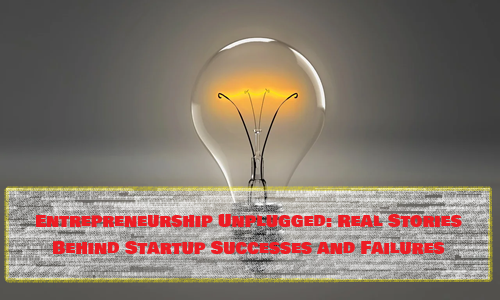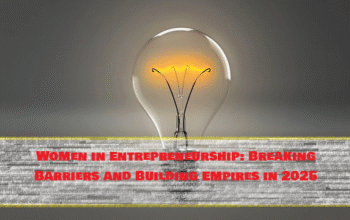Entrepreneurship Unplugged: Real Stories Behind Startup Successes and Failures
In the fast-paced world of startups, entrepreneurship is often glamorized as a thrilling journey of innovation, rapid growth, and big payoffs. But behind every viral success story, there are countless untold narratives of struggle, pivoting, and even failure. This blog takes you entrepreneurship unplugged — peeling back the layers to reveal authentic, real-world experiences that shape startup journeys. Whether you’re an aspiring founder or a curious reader, these stories offer valuable lessons that textbooks and motivational quotes often miss.
The Myth of Overnight Success
The media loves to spotlight startups that seem to explode onto the scene overnight — think Airbnb, Instagram, or Zoom. The reality? These companies spent years navigating setbacks, revising strategies, and enduring financial pressures before their breakthrough moments.
Take Airbnb as an example. Founded in 2008 during a tough financial crisis, the founders struggled to attract users initially. Their first version was a simple website offering air mattresses in a San Francisco apartment. It wasn’t a smooth ride — they went through multiple iterations, including attending design conferences to pitch their idea just to get by. Airbnb’s success came from relentless perseverance, continuous learning, and an unwavering belief in their vision despite early failures.
Lesson: Overnight success is usually years in the making. Patience and persistence are crucial virtues for entrepreneurs.
Failure is Part of the Journey
Not every startup story ends in a triumphant exit. In fact, according to various reports, approximately 90% of startups fail. This doesn’t mean failure is the end — it’s often the foundation for future success.
Consider the story of Sara Blakely, the founder of Spanx. Before Spanx became a billion-dollar shapewear brand, Sara faced multiple rejections from manufacturers and struggled with self-doubt. She didn’t have a business background, and her idea was initially laughed off by industry insiders. Yet, she embraced failure as a learning curve and pushed forward.
Similarly, many tech startups face product-market misfit issues, cash flow crises, or team conflicts that lead to shutdowns. The key is how founders respond: some pivot, some learn and try again, and others redefine what success means.
Lesson: Failure is not fatal. It is a stepping stone to growth and innovation.
Real Stories From Founders: Successes and Setbacks
1. The Power of Pivoting — Slack’s Journey
Slack is now a household name in workplace communication, but its origin story is a classic example of a pivot. Initially, the company was developing an online game called Glitch, which failed to gain traction. Instead of abandoning ship, the founders focused on the internal communication tool they had built for their team — which eventually became Slack.
Slack’s success highlights the importance of flexibility and responsiveness to market feedback. By paying attention to what users really needed, they transformed a failing product into a revolutionary tool.
2. Lessons From Early Failures — WeWork’s Rough Patch
WeWork, once valued at $47 billion, faced a spectacular downfall due to overexpansion and questionable leadership. Founder Adam Neumann’s story is a cautionary tale of rapid growth without solid foundations. The company’s failed IPO exposed financial mismanagement and unrealistic business models, resulting in massive valuation drops and leadership shakeups.
Despite these setbacks, WeWork has been restructuring and aims to rebuild trust. This shows that even high-profile failures can lead to opportunities for reinvention.
Common Challenges Startups Face
Funding Struggles
Raising capital is a major hurdle for most startups. Founders often spend months pitching to venture capitalists and angel investors with no guarantee of success. The pressure to secure funding can lead to compromises or unrealistic growth expectations.
Finding Product-Market Fit
A great product is meaningless without demand. Many startups launch without fully validating their market, which can result in wasted resources and early failure. Continuous customer feedback and iterative development are essential to hitting the right fit.
Building the Right Team
Startups thrive on strong teams, but recruiting and retaining talent in a competitive market is tough. Misaligned visions or poor communication can derail progress quickly.
Mental and Emotional Toll
Entrepreneurship is emotionally taxing. Stress, uncertainty, and the fear of failure can impact mental health. Founders need support networks and strategies to maintain balance.
Practical Tips for Aspiring Entrepreneurs
- Embrace the Learning Process: Understand that mistakes and failures are part of the journey. Reflect on setbacks and use them to improve.
- Validate Early and Often: Before fully committing, test your ideas with real users to ensure there’s demand.
- Build Resilience: Cultivate mental toughness and a positive mindset. Entrepreneurship is a marathon, not a sprint.
- Focus on Cash Flow: Many startups fail due to running out of money. Keep tight control on finances and have a runway plan.
- Network Relentlessly: Surround yourself with mentors, peers, and advisors who can offer guidance and support.
- Be Ready to Pivot: Stay open to changing your product or business model based on market feedback.
Why Sharing Real Stories Matters
Too often, entrepreneurship content focuses on polished successes, glossing over the messy, unpredictable reality. By sharing real stories behind startup successes and failures, we demystify the entrepreneurial experience and inspire others to take calculated risks.
Moreover, these authentic narratives help build a community of learners and doers who understand that setbacks aren’t shameful but are essential parts of innovation.
SEO Keywords and Phrases to Know
For this blog, we’ve integrated relevant SEO keywords to boost discoverability by your target audience:
- Startup success stories
- Entrepreneurship failures
- Real startup stories
- Lessons from startup failures
- How to succeed in entrepreneurship
- Startup challenges and solutions
- Entrepreneur tips and advice
- Startup pivot examples
- Mental health for entrepreneurs
- Funding struggles for startups
Using these keywords naturally in headings and content helps search engines connect your blog to users seeking genuine startup insights.
Final Thoughts: Entrepreneurship is a Journey, Not a Destination
Entrepreneurship unplugged is about telling it like it is — the ups, the downs, the pivot points, and the personal growth. Success is rarely linear, and every founder’s path is unique. By learning from real stories of success and failure, aspiring entrepreneurs can set realistic expectations and build the resilience needed to thrive.
If you’re thinking about starting your own venture, remember: the road will be bumpy, but every experience, good or bad, adds to your entrepreneurial wisdom. Keep innovating, keep learning, and never stop telling your story.
If you found these real startup stories inspiring, share your thoughts or your own experiences in the comments below! Let’s build a community where honesty fuels innovation.



